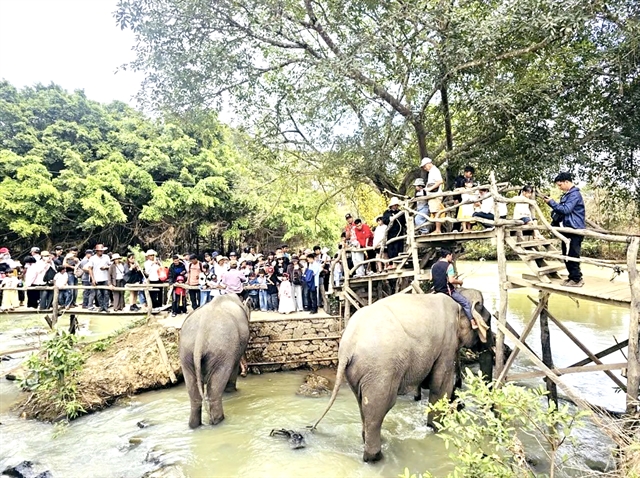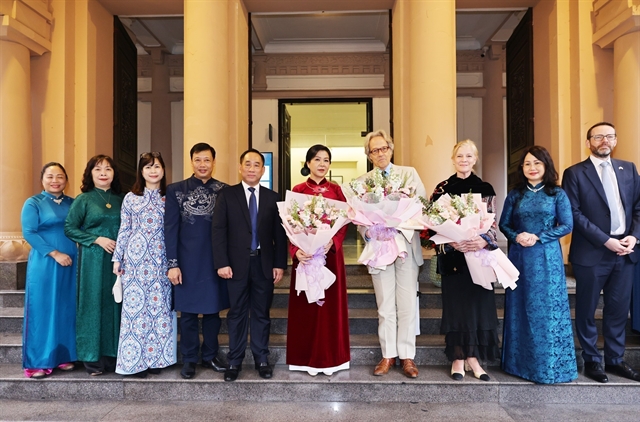 Society
Society

Lường Văn Dũng, 40, decided to work as a teacher in a school 300km away from his home in Điện Biện Phủ City.
.jpeg)
|
| Lường Văn Dũng spends more than 20 years teaching in a remote commune of Điện Biên Province. — Photo giaoducthoidai.vn |
ĐIỆN BIÊN — A Thai ethnicity teacher devoted his youth to his students in a remote mountainous commune in Điện Biên Province.
Lường Văn Dũng, 40, decided to work as a teacher in a school 300km away from his home in Điện Biện Phủ City.
He had to walk 70km to reach the school for the first time.
In 2004, after getting a diploma from Điện Biên Pedagogical College, Dũng was thrilled to apply to work in the remote border district of Mường Nhé to work.
“At that time, I did not know what Mường Nhé was like,” he told giaoducthoidai.vn.
“I only knew that it was a district that had just been established,” Dũng recalled.
“I heard that the district was still in a very difficult situation and no one wanted to go there,” he said.
“But I did the opposite," he said.
After getting hired as a teacher at Sín Thầu Primary and Secondary School in Sín Thầu Commune, Dũng said goodbye to his parents and brothers and set off.
“At that time, because it was newly established, there was no bus to the district centre. So I had to pay VNĐ600,000 (US$26) for a xê ôm (motorbike taxi) to go about 70km further into the border area,” he said.
“But there was no road for the final 70km, so I just followed the trail and walked. It took three days to reach the centre of Sín Thầu Commune,” he said.
“Thinking back to the old days, I was still afraid,” the teacher said.
Living and working in the poor communes was very tough.
“The day I said goodbye to my parents, they gave me VNĐ1.5 million. The motorbike taxi ride cost VNĐ600,000. I still had VNĐ900,000 in my pocket to feed myself for a month until getting paid,” he said.
With his modest salary, he had to live very frugally and sometimes had to wait for the next payday to buy more food.
“When I was short of food, I had to borrow rice from the local people, buy food on credit, ask for vegetables for free from the farmers,” he said.
This meant he rarely went home to visit his family.
“I could only go home once a year on Tết (Lunar New Year) holiday. Although in the summer school was off I had to stay at school to tutor my students,” the teacher said.
Wife’s sympathy
When he was a student, he fell in love with Nguyễn Thị Dung who was from northern Thái Nguyên Province. They married after he worked as a teacher for a year.
His wife stayed in his home in Điện Biên Phủ city while Dũng worked 300km from home.
This was a great challenge for the young couple.
They didn't save money for nice meals out but for bus tickets for whenever he came back to visit his wife and children when they were sick.
"Whenever I went back to the city, it took me three days to walk from Tả Kho Khừ Village of Sín Thầu Commune to Mường Toong Commune.
"From Mường Toong Commune, I had to rent a motorbike taxi, it cost VNĐ600,000 to go another 70km to the place where I could get a coach home," he said.
In total, the arduous journey takes six days.
So, every year, he just spends a few days with his wife and children.
In 2007, his wife gave birth to a healthy and beautiful girl named Lương Thị Diễm Lệ but Dũng was still far away.
When he heard that his wife had been admitted to the hospital to give birth, he could not go to her and just had to wait for the news.
But thinking of his young wife in pain, he asked for a break from school for a few days and then hurried back.
At home, his daughter was born a few days before he made it back.
“I also felt guilty because at that important moment when my wife suffered alone I was not there to hold her hands,” Dũng said.
“And I also felt regretful to not be able to welcome my child from the birth room. That moment was very sacred," said Dũng.
Their second daughter was also born without her father’s presence.
Over the years, every time the mother or children were sick, they didn't have Dũng to lean on, while his meagre salary meant the family struggled to get by.
First bricks
In 2004, when Dũng started to work, the Sín Thầu Primary and Secondary School had only three classes of 6th, 7th and 8th grade.
“At that time, the highest grade was only 8th. And families who could afford to send their children out to stay with acquaintances to study higher classes outside the commune or to Mường Tè District of neighbouring Lai Châu Province,” he recalled.
The majority of local people were illiterate.
The population in Sín Thầu Commune are Hà Nhì ethnic minorities while Dũng is from the Thái ethnic minority so the language barrier made his job more difficult.
“Language differences were also a big problem. Therefore, I learned the language through my colleagues to understand the language, customs and habits of the local people,” he said
“That's how I encourage people to send their children to class," said Dũng.
As the years went by, he fell in love with the land and the people of Sín Thầu.
There were many opportunities to move work to a location closer to home but he could not bear to leave, despite the difficulties and hardships he and his wife have experienced during the past 20 years.
What makes him happy is still keeping a warm family and two children who are obedient and study well.
He is more than happy that from a land where no students passed the 9th grade, now, every year hundreds of Hà Nhì ethnic students go up to higher grades, and dozens of them have entered universities and colleges across the country.
“Every day, just thinking about the bright faces when the students come to class makes my heart feel infinitely happy,” Dũng said.
“Thinking about this, the merits of placing the 'first bricks' of generations of teachers in this remote place are worth it,” he added. VNS




